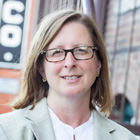
- This event has passed.
Material Cultures of Preservation, Transformation, Erasure, and Memorialization
November 2, 2023 - November 5, 2023
What would it look like for sites of public memory, memorialization, and preservation to act as places of justice, community, and care? What kinds of feelings do these places and things engender? Joy, rage, mourning, exhaustion, hope, love? This session examines the dynamics of public space, acts of preservation, and places and things of memory through the lens of community, examining moments of failure and erasure alongside moments of love and solidarity.
Penn State Harrisburg graduate student Jeremy Boorum considers the whitewashing of the Gloria Casarez mural in Philadelphia, examining the ways in which race, sexuality, and dynamics of gentrification affect the formation of queer publics and counterpublics. Boorum’s analysis extends beyond the whitewashing of this public memorial to a local LGBTQ+ activist, attending to the ways in which mourning, loss, and love “allowed for a community to come together as an act of solidarity against the impending forces of gentrification and capitalism in queer neighborhoods.”
Dr. Sarah A. Carter, Executive Director of the Center for Design and Material Culture and Associate Professor of Design Studies in the School of Human Ecology at the University of Wisconsin-Madison, also explores the feelings that adhere to material things in public spaces and the extended emotional lives of communal objects. Her paper, “Art, Anthropology, and Belonging Outside the Milwaukee Public Museum, 1922-1972,” examines the shifting narratives, sentiments, and political meanings that coalesced around a Haida totem pole placed in front of the Milwaukee Public Museum. Carter asserts that this object was “as an emotional touchstone, challenging citizens to consider the place and purpose of the museum in their city—and how they felt about it,” exploring 50 years of complex museum feelings.
Dr. Laura A. Macaluso, scholar of monuments, murals, and material culture, analyzes an absence in the public memory-making process. In “The Panther and the Bulldog: The Material Culture of May Day 1970 and the Black Panther Party in New Haven, Connecticut,” Macaluso turns her attention to the role of the Black Panther Party in New Haven, Connecticut and the absence of public memorialization of the May Day 1970 protests. She examines the extant material culture in local collections related to this historical moment of solidarity, asking what these preserved objects say “about the work towards social justice organizing across color, gender, and economic lines and about the people and institutions who collected them.”
Maddie Webster, a PhD candidate in American Studies at Boston University, turns her attention to an act of what she terms “radical preservation” at Boston’s Franklin Park in the 1960s and 70s. Her paper examines Elma Lewis’s community activism at a site marked by environmental racism, transforming this neglected historic park into a communal performing arts venue. Webster argues that Lewis “demonstrated the legitimacy of a social justice adaptive reuse strategy for historic landscapes.”
Finally, Dr. Andrea Burns, Associate Professor of History at Appalachian State University and leading thinker on museum studies and the presentation of community and memory in public space, will offer a comment on the panel.
